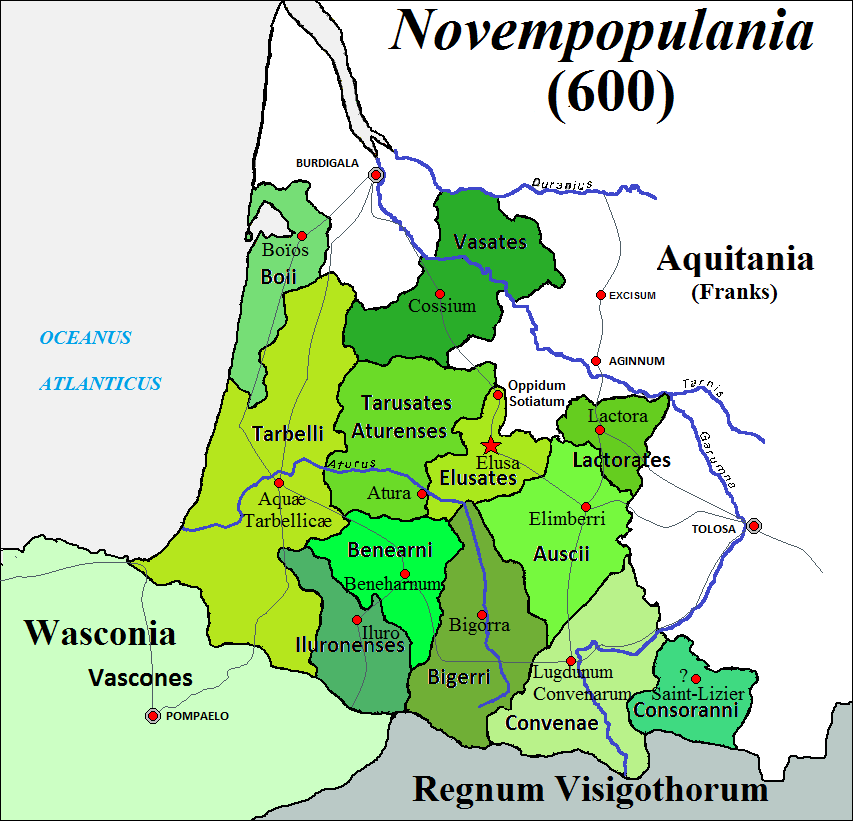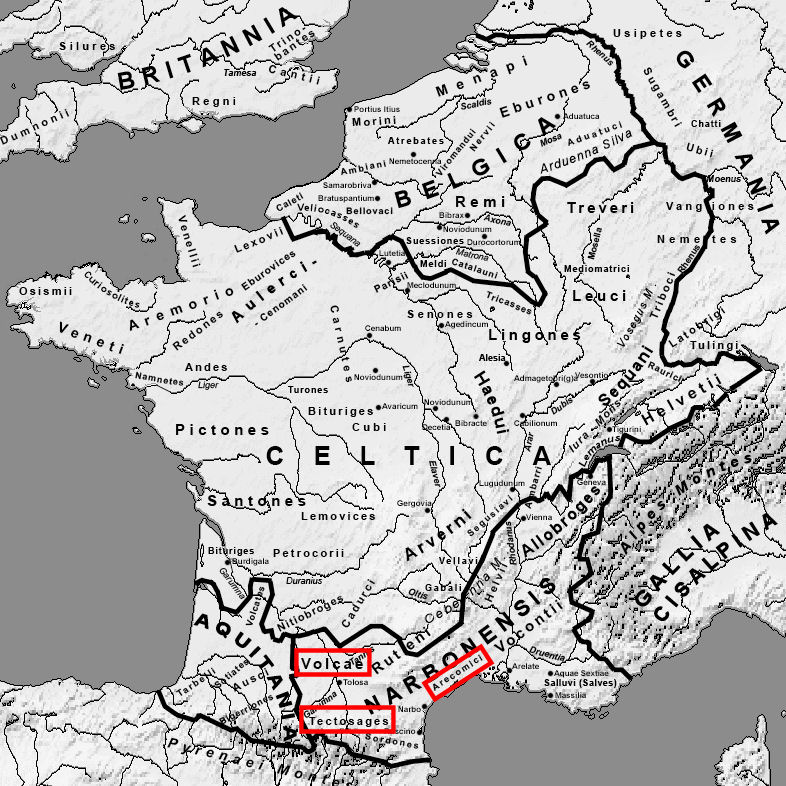|
Auscii
The Auscii or Ausci were an Aquitani tribe dwelling around present-day Auch during the Iron Age. Alongside the Tarbelli, they were one of the most powerful peoples of Aquitania. Name They are mentioned as ''Ausci'' by Caesar (mid-1st c. BC), Pliny (1st c. AD) and Pomponius Mela (mid-1st c. AD), and as ''Au̓skíois'' (Αὐσκίοις) by Strabo (early 1st c. AD)., s.v. ''Auscii''. The ethnonym ''Auscii'' may be related to the prefix ''eusk''-, meaning 'Basque' in the Basque language (''euskara''). The city of Auch, attested as ''civitas Auscius'' in the early 4th century AD, is named after the tribe. Geography Their territory was located north of the Onobrisates, west of the Cambolectri and Volcae Tectosages, south of the Lactorates, west of the Atures. The chief town of the Auscii was known as Elimberrum (modern Auch), whose name can be compared to the Basque ''ili-berri'' ('new town'). Culture It is believed that the Auscii spoke a form or dialect of the Aquit ... [...More Info...] [...Related Items...] OR: [Wikipedia] [Google] [Baidu] |
Auch
Auch (; ) is a Communes of France, commune in southwestern France. Located in the Regions of France, region of Occitania (administrative region), Occitanie, it is the capital of the Gers Departments of France, department. Geography Localization The commune of Auch is located in the arrondissement of Auch and in the Gers (river), Gers valley, roughly in the centre of the Gers département. Auch is west of Toulouse, the capital of the Occitania (administrative region), Occitanie region, and from Montauban, from Agen, from Mont-de-Marsan, from Pau, Pyrénées-Atlantiques, Pau and from Tarbes, the capitals of the neighbouring départements. It is 162 km from Bordeaux, from Marseille and from Lyon, the capitals of the neighbouring regions, and south-west of Paris. The commune covers an area of . Surrounding communes Auch borders thirteen other communes: Barran, Castillon-Massas, Castin, Duran, Gers, Duran, Lasséran, Leboulin, Montaut-les-Créneaux, Montégut, Gers, ... [...More Info...] [...Related Items...] OR: [Wikipedia] [Google] [Baidu] |
Tarbelli
The Tarbelli were an Aquitani tribe dwelling in the present-day regions of Labourd and Chalosse, in the west of Aquitania, during the Iron Age. Alongside the Auscii, they were one of the most powerful peoples of Aquitania. They were subjugated in 56 BC by the Roman forces of Caesar's legatus P. Licinius Crassus. Name They are mentioned as ''Tarbelli'' by Caesar (mid-1st c. BC), as ''Tárbelloi'' (Τάρβελλοι) by Strabo (early 1st c. AD), as ''Tarbelli Quattuorsignani'' by Pliny (1st c. AD), and as ''Tarbellus'' on an inscription., s.v. ''Tarbelli (Quattuorsignani)''. Joaquín Gorrochategui proposed to see the name as the suffix ''tar''- attached to the adjective ''bel'' ('black'), which is common in Aquitanian onomastics. Geography The Tarbelli lived in the regions of Labourd and Chalosse, on both sides of the Adour river. Their territory was located east of the Atlantic Ocean, north of the Vardulli, south of the Cocosates, west of the Tarusates, Atures and ... [...More Info...] [...Related Items...] OR: [Wikipedia] [Google] [Baidu] |
Aquitani Tribes Map-fr
The Aquitani were a tribe that lived in the region between the Pyrenees, the Atlantic Ocean, and the Garonne, in present-day southwestern France in the 1st century BC. The Romans dubbed this region ''Gallia Aquitania''. Classical authors such as Julius Caesar and Strabo clearly distinguish the Aquitani from the other peoples of Gaul, and note their similarity to others in the Iberian Peninsula. Their old language, the Aquitanian language, was a precursor of the Basque language and the substrate for the Gascon language (one of the Romance languages) spoken in Gascony. Between the 1st century and the 13th century, the Aquitani gradually adopted the Gascon language while part of the Roman Empire, then the Duchy of Gascony and the Duchy of Aquitaine. History At the time of the Roman conquest, Julius Caesar, who defeated them in his campaign in Gaul, describes them as making up a distinct part of Gaul: Despite apparent cultural and linguistic connections to ( Vascones), the reg ... [...More Info...] [...Related Items...] OR: [Wikipedia] [Google] [Baidu] |
Ethnonym
An ethnonym () is a name applied to a given ethnic group. Ethnonyms can be divided into two categories: exonyms (whose name of the ethnic group has been created by another group of people) and autonyms, or endonyms (whose name is created and used by the ethnic group itself). For example, the dominant ethnic group of Germany is the Germans. The ethnonym ''Germans'' is a Latin-derived exonym used in the English language, but the Germans call themselves , an endonym. The German people are identified by a variety of exonyms across Europe, such as (French language, French), (Italian language, Italian), (Swedish language, Swedish) and (Polish language, Polish). As a sub-field of anthroponymy, the study of ethnonyms is called ethnonymy or ethnonymics. Ethnonyms should not be confused with demonyms, which designate all the people of a geographic territory, regardless of ethnic or linguistic divisions within its population. Variations Numerous ethnonyms can apply to the same ethni ... [...More Info...] [...Related Items...] OR: [Wikipedia] [Google] [Baidu] |
Basque Language
Basque ( ; ) is a language spoken by Basques and other residents of the Basque Country (greater region), Basque Country, a region that straddles the westernmost Pyrenees in adjacent parts of northern Spain and southwestern France. Basque is classified as a language isolate (unrelated to any other known languages), the only one in Europe. The Basques are indigenous to and primarily inhabit the Basque Country. The Basque language is spoken by 806,000 Basques in all territories. Of them, 93.7% (756,000) are in the Spanish area of the Basque Country and the remaining 6.3% (50,000) are in the French portion. Native speakers live in a contiguous area that includes parts of four Spanish provinces and the French Basque Country, three "ancient provinces" in France. Gipuzkoa, most of Biscay, a few municipalities on the northern border of Álava and the northern area of Navarre formed the core of the remaining Basque-speaking area before measures were introduced in the 1980s to stre ... [...More Info...] [...Related Items...] OR: [Wikipedia] [Google] [Baidu] |
Aquitanian Language
The Aquitanian language was the language of the ancient Aquitani, a people living in Roman times between the Pyrenees, the Garonne river and the Atlantic Ocean. Epigraphic evidence for this language has also been found south of the Pyrenees, in Navarre and Castile. There is no surviving text written in Aquitanian. The only evidence comes from onomastic data (roughly 200 personal names and about 60 deity names) that have survived indirectly in Latin inscriptions from the Roman imperial period, primarily between the 1st and 3rd centuries AD, with a few possibly dating to the 4th or 5th centuries. The Gascon language has a substrate from Aquitanian, with certain words related to Basque. Relationship to Basque The consensus among scholars is that Aquitanian was a Paleo-European language genetically related to Basque, though there is debate over the exact nature of their relationship. Some linguists, like R. L. Trask, argue that it was a near-direct ancestor of Basque, whi ... [...More Info...] [...Related Items...] OR: [Wikipedia] [Google] [Baidu] |
Volcae Tectosages
The Volcae () were a Gallic tribal confederation constituted before the raid of combined Gauls that invaded Macedonia c. 270 BC and fought the assembled Greeks at the Battle of Thermopylae in 279 BC. Tribes known by the name Volcae were found simultaneously in southern Gaul, Moravia, the Ebro valley of the Iberian Peninsula, and Galatia in Anatolia. The Volcae appear to have been part of the late La Tène material culture, and a Celtic identity has been attributed to the Volcae, based on mentions in Greek and Latin sources as well as onomastic evidence. Driven by highly mobile groups operating outside the tribal system and comprising diverse elements, the Volcae were one of the new ethnic entities formed during the Celtic military expansion at the beginning of the 3rd century BC. Collecting in the famous excursion into the Balkans, ostensibly, from the Greek point of view, to raid Delphi, a branch of the Volcae split from the main group on the way into the Balkans and joined two ... [...More Info...] [...Related Items...] OR: [Wikipedia] [Google] [Baidu] |
Euskara
Basque ( ; ) is a language spoken by Basques and other residents of the Basque Country, a region that straddles the westernmost Pyrenees in adjacent parts of northern Spain and southwestern France. Basque is classified as a language isolate (unrelated to any other known languages), the only one in Europe. The Basques are indigenous to and primarily inhabit the Basque Country. The Basque language is spoken by 806,000 Basques in all territories. Of them, 93.7% (756,000) are in the Spanish area of the Basque Country and the remaining 6.3% (50,000) are in the French portion. Native speakers live in a contiguous area that includes parts of four Spanish provinces and the three "ancient provinces" in France. Gipuzkoa, most of Biscay, a few municipalities on the northern border of Álava and the northern area of Navarre formed the core of the remaining Basque-speaking area before measures were introduced in the 1980s to strengthen Basque fluency. By contrast, most of Álava, th ... [...More Info...] [...Related Items...] OR: [Wikipedia] [Google] [Baidu] |



